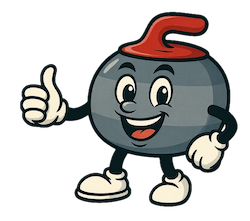What is curling?
Welcome to the world of curling! Whether you're a beginner or just curious about this great social game, we're here to teach you the basic terminology, technique, and strategy of curling. Let's rock!
Terminology
Before we get into the technique and strategy, let's familiarize ourselves with some key terms used in curling. We'll use a few images along the way!
The ice:
- Sheet: The playing surface of a curling rink.
- Hack: The foothold from which a player delivers the stone.
- House: The target area consisting of concentric circles at the end of the sheet.
- Button: The center of the house.
- Tee line: The line that runs across the width of the sheet at the center of each house.
- Hog line: The line that runs across the width of the sheet defining the eligible area for stones to remain in play.
- Back line: The boundary line at the back of the house.

Diagram from the Kirkland Lake Curling Club website.
The players:
- Skip: The team captain responsible for calling each shot.
- Vice, Third, or Mate: The third player to throw stones and calls the shots when the skip is throwing their stones.
- Second: The player who throws the second pair of stones and sweeps the remaining six team stones.
- Lead: The player who throws the first pair of stones and sweeps the remaining six team stones.
The shots:
- Guard: A stone placed in front of the house to protect other stones.
- Takeout: A shot that removes an opponent's stone from play.
- Draw: A shot that aims to land the stone in the house.
Technique
Now that we know the terminology, let's talk about the basic technique of delivering a curling stone:
- Grip: Hold the handle of the stone with your dominant hand, pointing the front of the handle at the outstretched hand of the skip.
- Stance: Stand with your feet shoulder-width apart, facing the direction you want to throw the stone.
- Slide: Push off from the hack with your non-dominant foot, sliding forward on the ice.
- Release: As you slide, extend your arm forward and release the stone with a gentle push.
- Follow-through: After releasing the stone, maintain your balance and follow through with your throwing arm.
Gameplay
Each team has eight stones and the two teams alternate turns throwing their stones from one hack to the opposite house. A round of throwing all the rocks is called an end. The team with the closest stone to the middle of the house will be the only team to score points in that end. They score as many points as they have rocks in the house that are closer to the center than an opponent rock. Here are a few scoring examples from the South of England Curling Club website:

Strategy
Curling is sometimes described as "chess on ice." There are several types of shots you can use to outscore your opponent:
- Guards: Place a stone in front of the house to protect your own stones.
- Takeouts or Hits: Remove your opponent's stones from play by hitting them with your own stones.
- Draws: Aim to land your stone in the house, closer to the button than your opponent's stones.
- Freeze: Position your stone in front of or behind an opponent's stone to limit their scoring potential.
- Split: Separate your stones to cover more area in the house and increase your scoring chances.
What about sweeping, you ask?
Sweeping the ice in front of the path of a moving stone is used to influence its speed and direction. You should sweep a stone when you want it to stay on a straighter path and travel further down the ice.
We hope this introduction to curling has sparked your interest and given you a better understanding of the sport. If you have any further questions or want to learn more, feel free to reach out to us at Good Curling Company. Good curling!






